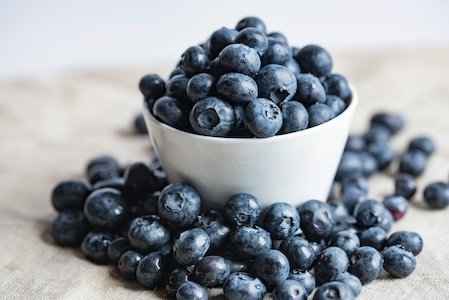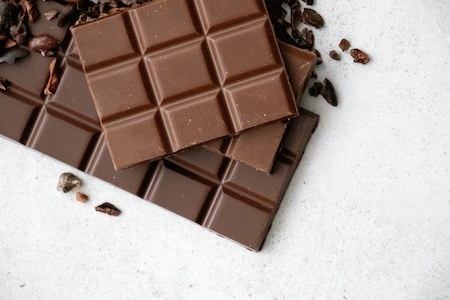在這個資訊爆炸的時代,我們的大腦每天都在高速運轉。無論是學生、上班族還是銀髮族,維持良好的腦部健康都至關重要。但你知道嗎?透過日常飲食,我們就能為大腦提供強大的營養支持!本文將為您介紹10種素食可食的超級補腦食材,不僅美味可口,更能幫助您保持腦力充沛、記憶力超群!
為什麼腦健康如此重要?
隨著年齡增長,我們的認知功能可能會逐漸下降。根據研究,台灣45歲以上人口的失智症盛行率呈上升趨勢,且有年輕化的現象。因此,及早關注腦健康,通過飲食來滋養大腦,變得比以往任何時候都更加重要。
10種強效補腦食物,讓你的大腦煥發活力
1. 堅果
堅果,特別是核桃,被譽為「腦食物」之王。它們富含omega-3脂肪酸、維生素E和抗氧化物質,能有效保護腦細胞,改善認知功能。研究表明,經常食用堅果的人在記憶力和思維能力測試中表現更佳。除了核桃,杏仁、腰果等其他堅果也都是不錯的選擇。
食用建議: 每天適量食用一小把堅果(約30克),可直接當零食,也可加入沙拉或穀物中食用。
2. 綠葉蔬菜
菠菜、羽衣甘藍等深綠色蔬菜含有豐富的維生素K、葉酸、β-胡蘿蔔素等營養素,這些成分有助於保護神經元,減緩認知能力的下降。研究顯示,每天攝入一份綠葉蔬菜的人,其大腦衰老速度比不常吃的人慢11年!且綠葉蔬菜中的抗氧化物質可以對抗自由基,減少氧化壓力對腦細胞的傷害。
食用建議: 每天至少食用一份綠葉蔬菜(約100克),可做成沙拉、煮湯或涼拌。
3. 全穀物
糙米、燕麥、全麥麵包等全穀物食品富含維生素E、B族維生素和礦物質。這些營養素能為大腦提供穩定的能量供應,有助於改善注意力和集中力。全穀物的膳食纖維還能幫助穩定血糖,間接支持腦部健康。穩定的血糖水平可以避免大腦能量供應的劇烈波動,有助於維持長時間的專注力。
食用建議: 每天攝入3-6份全穀物,可以將白米替換為糙米,選擇全麥麵包而非精製麵包。

4. 藍莓和其他漿果
藍莓、草莓等漿果類水果富含花青素等強大的抗氧化物質。這些成分能幫助對抗自由基,減少氧化壓力,保護腦細胞免受損害。研究發現,經常食用漿果類水果的人,其認知能力下降速度比較慢。其中藍莓被譽為「腦漿果」,不僅可以改善短期記憶,還可能有助於預防年齡相關的記憶力衰退。
食用建議: 每週食用2-3次漿果類水果,可直接食用,也可加入優格或穀物中。
5. 綠茶
綠茶含有豐富的兒茶素,這是一種強效抗氧化劑,能保護腦細胞免受自由基的損害。綠茶中的咖啡因和茶氨酸的組合,可以提高注意力和記憶力,同時減少焦慮。
食用建議: 每天飲用1-2杯綠茶,可選擇無糖或少糖的版本。
6. 咖啡
適量飲用咖啡不僅能提高清醒度,還可能有助於增強記憶力。咖啡中的咖啡因可以阻斷一種使人感到疲勞的腦內物質,從而提高集中力。一些研究甚至表明,長期適量飲用咖啡可能降低患阿茲海默症和帕金森氏症的風險。
食用建議: 每天飲用1-2杯咖啡,避免在晚間飲用以免影響睡眠。如果對咖啡因敏感,可以選擇低咖啡因或無咖啡因的版本,仍然可以享受到咖啡中其他有益成分的好處。

7. 黑巧克力
高可可含量(70%以上)的黑巧克力富含黃烷醇,這種物質可以改善血液流向大腦,增強認知功能。適量食用黑巧克力還可以改善心情,減少壓力。
食用建議: 每天食用20-30克高品質黑巧克力,作為下午的健康點心。選擇可可含量越高的黑巧克力,糖分就越少,對健康的益處也越大。不過要注意控制攝入量,因為即使是黑巧克力,熱量也不低。
8. 南瓜
南瓜富含維生素A、C和E,以及礦物質如鐵和鎂。這些營養素對於維持腦細胞健康和神經傳導至關重要。南瓜中的抗氧化物質還可以保護大腦免受氧化應激的傷害。南瓜籽更是營養密集,富含鋅和omega-3脂肪酸,對大腦健康大有裨益。
食用建議: 每週食用1-2次南瓜,可烤、煮或做成湯。南瓜籽再稍加烘烤後則可以當作健康零食。
9. 豆類
鷹嘴豆、小扁豆等豆類食品富含蛋白質、B族維生素和礦物質。這些營養素對於神經傳導物質的合成和腦細胞的修復非常重要。豆類的低升糖指數特性也有助於維持穩定的血糖水平,為大腦提供持續的能量。
食用建議: 每週食用3-4次豆類,可做成沙拉、湯或作為主菜的一部分。也可嘗試製作鷹嘴豆泥(hummus)作為健康的點心,既美味又營養。

10. 酪梨
酪梨富含單不飽和脂肪酸和維生素K,這些營養素對於維持腦細胞的健康和功能至關重要。酪梨還含有葉酸和維生素C,有助於整體腦部健康。它的脂肪含量雖然較高,但主要是健康的單不飽和脂肪,有助於降低血壓。
食用建議: 每週食用2-3次酪梨,可直接食用,也可做成沙拉或醬料。將酪梨切片加入全麥吐司上,不僅美味,還能提供一天所需的健康脂肪和纖維。
均衡飲食是關鍵
這10種食材對大腦健康大有裨益,但記住,沒有單一的「神奇食物」能確保腦部健康。最重要的是保持均衡的飲食習慣,多攝入水果、蔬菜、全穀物和健康脂肪。同時,適度運動、保持充足睡眠和管理壓力也是維護腦健康的重要因素。
透過將這些補腦食材納入日常飲食,再配合健康的生活方式,你就能為自己的大腦提供最好的營養支持,保持思維敏捷、記憶力超群!讓我們一起關注腦健康,用美味的食物滋養我們的大腦吧!

Don't Ignore Your Brain Health! These 10 Delicious Foods Boost Brain Power!
In this age of information overload, our brains are constantly working at high speed. Whether you're a student, a working professional, or a senior citizen, maintaining good brain health is crucial. But did you know that through our daily diet, we can provide powerful nutritional support for our brains? This article will introduce you to 10 vegan-friendly superfoods for brain health that are not only delicious but can also help you maintain mental sharpness and exceptional memory!
Why is brain health so important?
As we age, our cognitive functions may gradually decline. According to research, the prevalence of dementia among Taiwan's population aged 45 and above is on the rise, with a trend towards earlier onset. Therefore, paying attention to brain health early on and nourishing the brain through diet has become more important than ever before.
10 powerful brain-boosting foods to revitalize your brain
1. Nuts
Nuts, especially walnuts, are hailed as the "brain food" king. They are rich in omega-3 fatty acids, vitamin E, and antioxidants, which can effectively protect brain cells and improve cognitive function. Studies have shown that people who regularly consume nuts perform better in memory and thinking ability tests. Besides walnuts, almonds and cashews are also excellent choices.
Consumption advice: Eat a small handful of nuts (about 30 grams) daily, either as a snack or added to salads or cereals.
2. Green Leafy Vegetables
Dark green vegetables like spinach and kale are rich in vitamin K, folic acid, beta-carotene, and other nutrients that help protect neurons and slow down cognitive decline. Research shows that people who eat a serving of leafy greens daily have brains that are 11 years younger than those who rarely eat them! The antioxidants in leafy greens can also combat free radicals and reduce oxidative stress on brain cells.
Consumption advice: Eat at least one serving of leafy greens (about 100 grams) daily, which can be prepared as salads, soups, or stir-fries.
3. Whole Grains
Whole grain foods such as brown rice, oats, and whole wheat bread are rich in vitamin E, B vitamins, and minerals. These nutrients provide stable energy supply to the brain, helping to improve attention and concentration. The dietary fiber in whole grains also helps stabilize blood sugar, indirectly supporting brain health. Stable blood sugar levels can prevent dramatic fluctuations in brain energy supply, helping to maintain long-term focus.
Consumption advice: Consume 3-6 servings of whole grains daily, replacing white rice with brown rice, and choosing whole wheat bread over refined bread.

4. Blueberries and Other Berries
Berries like blueberries and strawberries are rich in powerful antioxidants such as anthocyanins. These compounds help fight free radicals, reduce oxidative stress, and protect brain cells from damage. Research has found that people who regularly eat berries experience slower cognitive decline. Blueberries, in particular, are known as "brain berries" and can improve short-term memory and potentially prevent age-related memory decline.
Consumption advice: Eat berries 2-3 times a week, either on their own or added to yogurt or cereals.
5. Green Tea
Green tea is rich in catechins, powerful antioxidants that protect brain cells from free radical damage. The combination of caffeine and L-theanine in green tea can improve attention and memory while reducing anxiety.
Consumption advice: Drink 1-2 cups of green tea daily, choosing sugar-free or low-sugar versions.
6. Coffee
Moderate coffee consumption can not only increase alertness but may also help enhance memory. The caffeine in coffee can block a brain substance that makes people feel tired, thereby improving concentration. Some studies even suggest that long-term moderate coffee consumption may lower the risk of Alzheimer's and Parkinson's diseases.
Consumption advice: Drink 1-2 cups of coffee daily, avoiding consumption in the evening to prevent sleep disturbances. If you're sensitive to caffeine, you can choose low-caffeine or decaf versions to still enjoy the other beneficial components in coffee.

7. Dark Chocolate
Dark chocolate with high cocoa content (70% or above) is rich in flavonoids, which can improve blood flow to the brain and enhance cognitive function. Moderate consumption of dark chocolate can also improve mood and reduce stress.
Consumption advice: Eat 20-30 grams of high-quality dark chocolate daily as a healthy afternoon snack. Choose dark chocolate with higher cocoa content for less sugar and greater health benefits. However, be mindful of portion sizes, as even dark chocolate is high in calories.
8. Pumpkin
Pumpkin is rich in vitamins A, C, and E, as well as minerals like iron and magnesium. These nutrients are crucial for maintaining brain cell health and neural transmission. The antioxidants in pumpkin can also protect the brain from oxidative stress. Pumpkin seeds are particularly nutrient-dense, rich in zinc and omega-3 fatty acids, which are highly beneficial for brain health.
Consumption advice: Eat pumpkin 1-2 times a week, either roasted, boiled, or made into soup. Pumpkin seeds can be lightly roasted and eaten as a healthy snack.
9. Legumes
Legumes such as chickpeas and lentils are rich in protein, B vitamins, and minerals. These nutrients are essential for the synthesis of neurotransmitters and the repair of brain cells. The low glycemic index of legumes also helps maintain stable blood sugar levels, providing sustained energy for the brain.
Consumption advice: Eat legumes 3-4 times a week, prepared as salads, soups, or as part of main dishes. You can also try making hummus as a healthy and nutritious snack.

10. Avocado
Avocados are rich in monounsaturated fats and vitamin K, which are crucial for maintaining brain cell health and function. Avocados also contain folic acid and vitamin C, which contribute to overall brain health. Although high in fat content, it's primarily healthy monounsaturated fat, which can help lower blood pressure.
Consumption advice: Eat avocados 2-3 times a week, either on their own or in salads or as a spread. Adding avocado slices to whole wheat toast is not only delicious but also provides the healthy fats and fiber needed for the day.
Balanced diet is key
While these 10 foods greatly benefit brain health, remember that no single "miracle food" can ensure brain health. The most important thing is to maintain a balanced diet, consuming plenty of fruits, vegetables, whole grains, and healthy fats. Additionally, moderate exercise, getting enough sleep, and managing stress are also crucial factors in maintaining brain health.
By incorporating these brain-boosting foods into your daily diet and combining them with a healthy lifestyle, you can provide the best nutritional support for your brain, maintaining mental acuity and exceptional memory! Let's focus on brain health together and nourish our brains with delicious food!
Source:
https://www.commonhealth.com.tw/article/89128
https://www.health.harvard.edu/healthbeat/foods-linked-to-better-brainpower
https://www.unitypoint.org/news-and-articles/15-brain-foods-that-may-help-preserve-your-memory
https://www.medicalnewstoday.com/articles/324044#avocados



